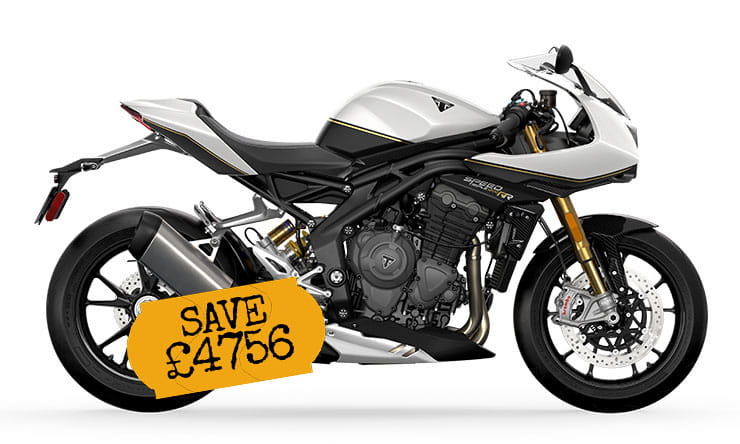Overview
We’ve all seen those new fangled three-wheeled scooters, they’re a growing market and in some European cities they outnumber two-wheeled machines quite easily. In 2015 Swiss company Quadro went one better…
It was the world’s first production four-wheeled tilting scooter, called the Quadro4 and powered by a 346cc, 30bhp single-cylinder engine. Disc brakes at each corner, twin-belt drive to the rear wheels and it could be ridden on either a bike or car licence. Five years on, this amazing machine is still the only tilting four-wheeler on the market, though it's been renamed the Qooder and updated with a slightly bigger, more powerful engine. The range has grown too, with an electric e-Qooder version using Zero's well proven motor and battery package – that gives a healthy 81lb ft and Qooder claims a range of around 90 miles. There's even an off-road version (petrol, not electric) and the company claims that the X-Qooder is the, 'world's first light enduro with four tilting wheels.' They're probably right.
For and against
- Unrivalled grip and stability
- Superb braking
- Still filters like a two-wheeler
- Expensive
- Heavy
- Only one UK dealer currently
Price
Qooders start at £10,500, which sounds expensive for a what is still a scooter, however sophisticated it is. Of its three-wheeler rivals, the top-spec Piaggio MP3 500 comes in at £8,799, with a basic 300cc version at £6,999. The Peugeot Metropolis isn't available in the UK currently, though the price was about on par with the mid-range MP3. Either way, the Qooder costs quite a bit more – is it worth it for the extra wheel? If you want to buy a Qooder, go to Hartgate Motorcycles in Mitcham, the sole dealer in the UK.
.ashx?h=740&la=en&w=740&hash=53D2941FAC5A60FB156A1EA6B3E169F49F4AC91E)
Power and licence eligibility
One of the Qooder's big selling points, like those three-wheel scooters, is that it can be driven on a car licence (providing you passed your car test before January 19th 2013). Despite having four wheels it is still classed as a tricycle due to the narrow track of its axles.
To me this is a little bit scary and good as it is to recruit non-riders it might be a good idea to do a CBT before riding something like the Qooder. Of course there’s nothing stopping car drivers from doing just that for their own peace of mind. Quite apart from being very different to a car, it weighs a hefty 281kg with a full tank which is a lot of weight to cope with.
Even coming from a scooter background the Qooder still takes a bit of getting used to. In a straight line it feels well planted and although not particularly fast on acceleration it’s still quite quick and will reach over 80mph. It's the weight that blunts the acceleration of course, but let's not get this out of proportion – the performance is easily enough to keep up with city traffic and for motorway cruising.
Once I’d mastered the way the scooter works (and to be fair, it only takes an hour) I really enjoyed the week I had with this new fangled machine. It can filter just as well as any other scooter and actually makes this easier in some respects because it’s so stable at slower speeds and the resistance from the hydraulic suspension means it’ll stay upright at a crawling pace through traffic. I did love riding it fast though, and it would be a mistake to see the four-wheel layout as aimed purely at inexperienced riders. If you like riding quickly, you’ll love counter steering this to get the best from it. The more you ride it the more you appreciate the way it works and realise that it’s great fun.
Engine and transmission
No surprises in the engine department, which is a typical big scooter unit, a compact, liquid-cooled four-valve single of 399cc putting out 32.5bhp and 28.4lb ft – that's less than the 500cc MP3, but a lot more torquey than the 350 option. It's competitive, in other words. This is a scooter, so the transmission is automatic twist and go, but the difference is in the mechanical differential (like that of a car) supplying torque to twin belt final drives, one to each rear wheel.
.ashx?h=493&la=en&w=740&hash=3A00051FA7342A55F59F8BAB30DC0A252EECF0F6)
Economy
Qooder claims 53.5mpg on the standard WMTC cycle. It might sound unimpressive for a scooter, but isn't bad compared with the MP3 and motorcycle equivalents. Inevitably, the Qooder's extra weight means a drinks a bit more fuel than those. There's only room for a 14-litre tank under the seat, which limits range – you'll be looking to fill up every 140 miles or so.
Handling, wheels and weight
Even if you've ridden three-wheeled scooter, the Qooder still takes some getting used to. That's despite the fact that all the controls are just what you would expect on a conventional scooter – so don’t expect to just jump on it and ride like a demon. For starters the tilting system – Dual Hydraulic Tilting System – is different. This allows the Qooder can balance in the upright position (MP3s etc need to be locked manually). Trusting what still feels like a two-wheeled machine to stay upright at a standstill with your feet up on the footboards takes some doing, but it just takes time to get used to. There’s also a tilt lock handle so the scooter can be locked upright whilst parked and a handbrake that can only be taken off whilst the key is in the ignition. The scooter can’t be ridden with the tilt locked, or the handbrake on.
Once you’ve mastered sitting upright (try it on a camber, or whilst the body is tilted and it’ll still tip over) and having sussed out the controls you can take the Qooder for a spin. Its four wheels are there for stability, in theory giving twice as much grip and traction as a two-wheel scooter.
But cornering isn’t as straightforward and intuitive as on an ‘ordinary’ tilting three-wheeler. Leaning into a bend as usual isn’t quite enough to get round, especially if going quickly. Steering round the corner and leaning doesn't work either – what you need to do is lean and use positive counter-steering. Do that, and the Qooder suddenly makes much more sense, happy to go as hard and fast as you like. There’s 45º of ground clearance to play with and I never found its limits.
The suspension is fantastic, you can hit a mid-corner pothole with two wheels at full tilt and not really worry about it. It's equally in the wet. Usually, a wet morning equals a cautious commute, but the Qooder, will have you praying for rain because you're riding is unaffected.
Brakes
With four discs rather than the usual two or three, the Qooder comes with a lot of braking power. The brakes are linked – use the rear lever and it operates all four wavy discs. They’re stonking, while the front two discs can be used on their own if you prefer and are powerful enough on their own as well. Naturally, ABS is part of the package.
Comfort and protection
Having four wheels doesn't bring any extra weather protection, and the Qooder has typical shielding for a big scooter, which means it's better than a naked motorcycle but not all-enveloping, so car drivers coming straight out of a tin box could be in for a shock. You can pay extra for a taller screen and transparent hand and leg protectors, or a Tucano leg cover, so there are options. The riding position is comfy and upright, with plenty of space for a pillion. And you probably will be riding it in bad weather, because that's the whole point of the Qooder, that it's useable in all conditions all year round, while retaining the ability of a two-wheeler to beat the traffic. Just to underline the fact, the company even lists winter tyres as an accessory – fit those and you’ll be having fun in the snow as well.
Rider aids and accessories
Apart from ABS, there aren't any, but arguably the Qooder doesn't need them. It's not a motorcycle, but aims to be simple fuss-free transport for year-round commuting. The HTS certainly counts as a rider aid, but we've already told you all about that.
.ashx?h=493&la=en&w=740&hash=E52FA467DA0A72D3ABA96A92EF681BFF48FADB34)
Storage capacity
There's modest storage under the seat and two small compartments under the dash, which contain a 12V socket and USB point. Most owners will probably want to fit a topbox as well, and Qooder offers 42 litre Kappa or 58-litre Givi options.
Qooder Verdict
With its aggressive styling, the Qooder has hints of jetski about it, but don't let that fool you. This is a true multi-function tool, practical for commuting and good for weekend thrashes into the bargain. Yes it's expensive, but it really does live up to the promise of those four wheels, having more stability than any two/three-wheeler, but not forgoing the fun of cornering lean. For a small number of year-round commuters, it's a good choice – it might even tempt more car drivers to forsake the tin box.
.ashx?h=493&la=en&w=740&hash=47ED0D792746EEFBCC4712862C269AEA043A28FB)
2020 Qooder spec
|
New price
|
From £10,500
|
|
Capacity
|
399cc
|
|
Bore x Stroke
|
84 x 72mm
|
|
Engine layout
|
Single cylinder, four-stroke
|
|
Engine details
|
Liquid-cooled, four-valve
|
|
Power
|
32.5bhp (23.8kW) @ 7,000rpm
|
|
Torque
|
28.4 lb-ft (38.5Nm) @ 5,000rpm
|
|
Top speed
|
Not quoted
|
|
Transmission
|
Automatic, twin-belt drive
|
|
Average fuel consumption
|
53.2mpg claimed
|
|
Tank size
|
14 litres
|
|
Max range to empty (theoretical)
|
161 miles
|
|
Reserve capacity
|
None
|
|
Rider aids
|
None
|
|
Frame
|
Tubular steel
|
|
Front suspension
|
HTS (hydro-pneumatic)
|
|
Front suspension adjustment
|
None
|
|
Rear suspension
|
HTS (hydro-pneumatic)
|
|
Rear suspension adjustment
|
|
|
Front brake
|
2 x 240mm discs
|
|
Rear brake
|
2 x 240mm discs
|
|
Front tyre
|
110/80 R14
|
|
Rear tyre
|
110/80 R14
|
|
Rake/Trail
|
36 degrees
|
|
Dimensions
|
2200mm x 840mm 1360mm (LxWxH)
|
|
Wheelbase
|
1580mm (front track: 550mm, rear track: 450mm)
|
|
Ground clearance
|
Not quoted
|
|
Seat height
|
780mm
|
|
Kerb weight
|
281kg
|
|
Warranty
|
Ulimited mileag / 2 years
|
|
MCIA Secured rating
|
Not yet included
|
|
Website
|
www.qooder.com
|
Looking for scooter or moped insurance? Get a quote for this machine with Bennetts moped and scooter insurance
.ashx?h=444&la=en&w=740&hash=6E6D679B753E43FF9B14A8952682BAA37709C3D6)
What is MCIA Secured?
MCIA Secured gives bike buyers the chance to see just how much work a manufacturer has put into making their new investment as resistant to theft as possible.
As we all know, the more security you use, the less chance there is of your bike being stolen. In fact, based on research by Bennetts, using a disc lock makes your machine three times less likely to be stolen, while heavy duty kit can make it less likely to be stolen than a car. For reviews of the best security products, click here.
MCIA Secured gives motorcycles a rating out of five stars, based on the following being fitted to a new bike as standard:
- A steering lock that meets the UNECE 62 standard
- An ignition immobiliser system
- A vehicle marking system
- An alarm system
- A vehicle tracking system with subscription
The higher the star rating, the better the security, so always ask your dealer what rating your bike has, and compare it to other machines on your shortlist.



.ashx?h=493&la=en&w=740&hash=6DC09C55A2CA7626141BE85380F127B6C44C4A46)
.ashx?h=493&la=en&w=740&hash=8472FC751BE40284AC3EBFB4DC0BA946A0EB223C)
.ashx?h=493&la=en&w=740&hash=D231A29F0E4D081358CEBB080893A4986722F461)
.ashx?h=740&la=en&w=740&hash=53D2941FAC5A60FB156A1EA6B3E169F49F4AC91E)
.ashx?h=493&la=en&w=740&hash=3A00051FA7342A55F59F8BAB30DC0A252EECF0F6)
.ashx?h=493&la=en&w=740&hash=514EC1BAC514783681F132640C6EC5B17BE9841C)
.ashx?h=493&la=en&w=740&hash=C4FF3239A362F86467F4D34D91734AA425972B76)
.ashx?h=493&la=en&w=740&hash=09D1D273A7599B1474F4B108203FBD2CDC81214A)
.ashx?h=493&la=en&w=740&hash=E52FA467DA0A72D3ABA96A92EF681BFF48FADB34)
.ashx?h=493&la=en&w=740&hash=47ED0D792746EEFBCC4712862C269AEA043A28FB)
.ashx?h=444&la=en&w=740&hash=6E6D679B753E43FF9B14A8952682BAA37709C3D6)


